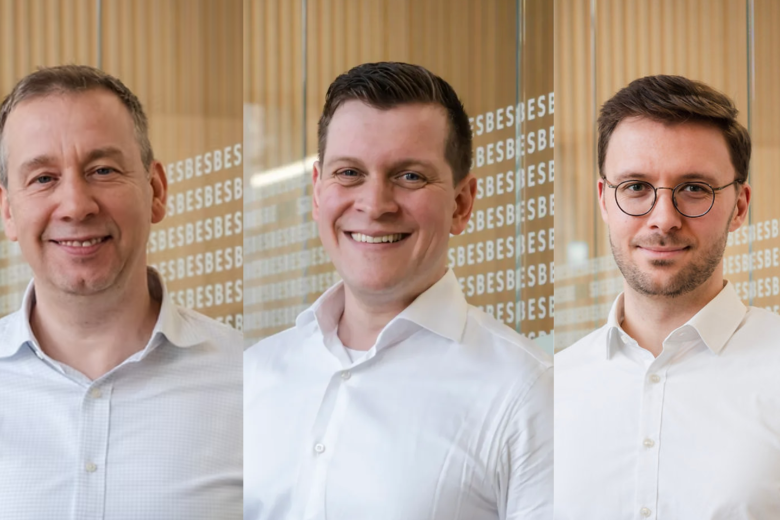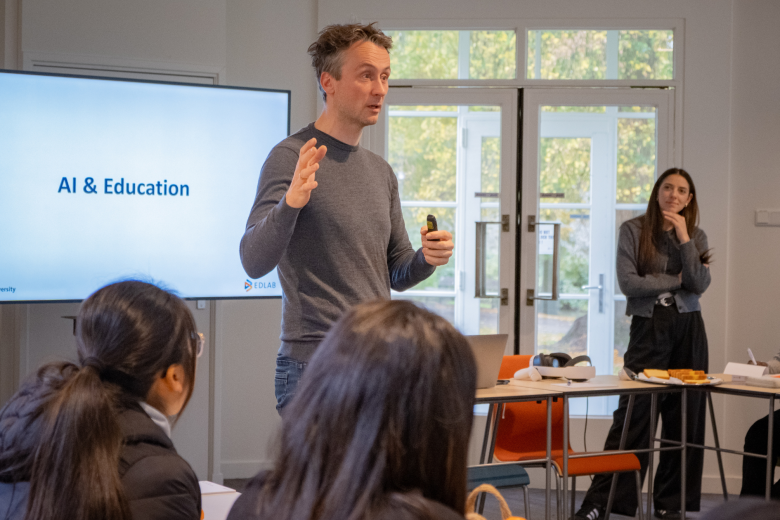The Third MORSE Conference 2023
MORSE hosted its third annual conference on 23-24-24 October 2023 in Maastricht. The event saw the participation of outstanding key noters, an interesting panel with SBE alumni and the presentation of more than 60 papers.
Scholars from UM, the Netherlands, Europe and beyond convened in Maastricht around the theme Science for a Sustainable, Resilient and Responsible Future and discussed state of the art academic work as well as engage in trans- and interdisciplinary discussions on how these latest insights can help in addressing today’s most urgent societal challenges.
The three days conference included a welcome by the Dean, Prof. Dr. Mariëlle Heijltjes, followed by a key note delivered by Dave Chen of Equilibrium, about the resilience from the perspective of an investor in real assets.
On the second day, MORSE hosted a panel with the SBE Alumni Lina Vollrath from Klöckner & Co SE, Moritz Takacs from Hardwick Climate Business Ltd, Christina Isabelle Volkmann by Henkel and Gijs Mensing by Rethinq. They discussed about the reflections on the economics and business curriculum by sustainability practitioners.
We closed the conference with a keynote by Kostas Triantis: "Resilient Systems: Lessons from Engineering and Economics". Prof Triantis also hosted an informal gathering with SBE PhDs who had the opportunity to present their project and receive a feedback.
Read below to get more insights about some of the conference milestones
Trade and Resilience Track
The conference track on “Trade and Resilience” called for applications which analyse how, in an uncertain world, shocks propagate along global value chains and what impacts these have on firms, local labour markets as well as aggregate economic performance. Indeed, the growing interconnectedness of economies in global value chains is a source of both resilience and vulnerability, in ways that beg further analysis.
The first session, entitled “Trade policy and cross country issues”, focused on supply chains, their disruptions and potential adjustments that are made to enhance their resilience. Alberto Palazzolo (Ecares – Université Libre de Bruxelles) discussed how “bringing supply chains back home” affects regional inequality across Europe, while Karsten Mau (Maastricht University) presented a documentation of adjustments in Dutch imports to the supply-sided disruptions experienced during the first year of the COVID-19 pandemic. Tom Notten (Statistics Netherlands) concluded the session with a discussion of Dutch industries’ dependence on specific trade partners.
The second session, entitled “Micro studies on trade transactions and networks” brought together further academic and institutional presenters. Angelo Cuzzola (Scuola Superiore Sant’Anna) showed how granular trade data can be used to understand aggregate volatility. Ken Kikkawa (UBC Sauder School of Business, Canada) discussed how firms’ market power on the supply and demand side shape trade in global value chains. Finally, Nieke Aerts (Statistics Netherlands) presented a method to infer sources of import dependence at the country level.
In particular, both tracks reflected the ongoing collaboration between the MILE department and Statistics Netherlands, which will be further enhanced via the joint organisation of the next ISGEP conference, happening on 27-28 June, stay tuned!
Resilience to Uncertainty
The subtheme centered on Resilience to Uncertainty featured three insightful sessions during the October 2023 MORSE conference. These sessions were titled "Uncertainty in Empirical Macroeconomics and Financial Markets", "Effects of Uncertainty", and "Measurement of Uncertainty". Consequently, over the course of three days, a substantial gathering of researchers from across Europe converged to delve into various related and complementary facets of uncertainty research.
The unique arrangement of hosting each session on a different conference day fostered a cohesive and dynamic group of researchers. The whole team actively participated in all sessions, engaging in discussions that spanned from conventional models and aggregate data to contemporary data science techniques, encompassing firm-level datasets and studies involving social media data. The synergy among presenters transcended the session boundaries, extending into the vibrant social events and giving rise to currently ongoing email exchanges, as well as subsequent exchanges at conferences hosted by other participating institutions.
The strong academic and policy relevant focus of the three tracks was repeatedly commended, as the discussion alternated across the rich and different facets characterizing this quantitative, interdisciplinary topic. Participants in all the three tracks went home with a positive experience, having received useful feedback on their research and having felt part of the uncertainty community hosted by MORSE at Maastricht.
An informal gathering with Kostas Triantis
At the MORSE conference 2023, we engaged in a unique and enriching experience—an informal gathering tailored exclusively for the PhD students of the MORSE community, with our keynote speaker, Kostas Triantis. This session provided a valuable platform for us to share aspects of our research, ranging from the central idea of our PhD theses to specific chapters or ongoing work.
Professor Triantis, alongside Jaap Bos and the other participants, offered insightful and constructive feedback. The collaborative atmosphere fostered meaningful discussions on potential avenues for advancing our work, enhancing its scientific rigor, and fortifying its societal impact.
The culmination of this event marked a highlight of the MORSE conference 2023—an intellectually stimulating and fruitful brainstorming session. It not only enriched our perspectives but also underscored the significance of interdisciplinary collaboration within the MORSE community. This gathering served as a great conclusion, leaving us inspired and motivated to further develop and contribute to the academic and societal landscape.
Maria Tomai, PhD candidate at UNU-MERIT
The informal PhD meeting with Kostas and Jaap was highly beneficial as it allowed us to pitch research ideas for the first time and hear their (and other PhDs present in the session's) feedback and help. It was also incredibly kind of them to share their research experience and the post-PhD job market and hear our ideas for a future research agenda. I do hope that in the next MORSE conferences, there will be similar sessions with the plenary speaker(s).
Siavash Mohades Forooshani, PhD candidate at MILE
Also read
-
Teacher Information Points at UM
UM faculties now host Teacher Information Points (TIPs) that offer local, “just-in-time” and on-demand support for teaching staff. The aim is simple: to provide help that is closely connected to day-to-day teaching practice.

-
Shaping the future of marketing: SBE scholars at the forefront of research and teaching
Three faculty members from SBE’s Department of Marketing & Supply Chain Management, Prof. Dr. Dominik Mahr, Dr. Jonas Heller, and Dr. Tim Hilken, combine cutting-edge research with innovative teaching and mentorship. From exploring the societal implications of digitalisation in courses such as...

-
UWC Maastricht students get a taste of education innovation at EDLAB
On 21 October 2025, EDLAB hosted students from United World College Maastricht for the second year in a row, as part of their Youth Social Entrepreneurship programme.
